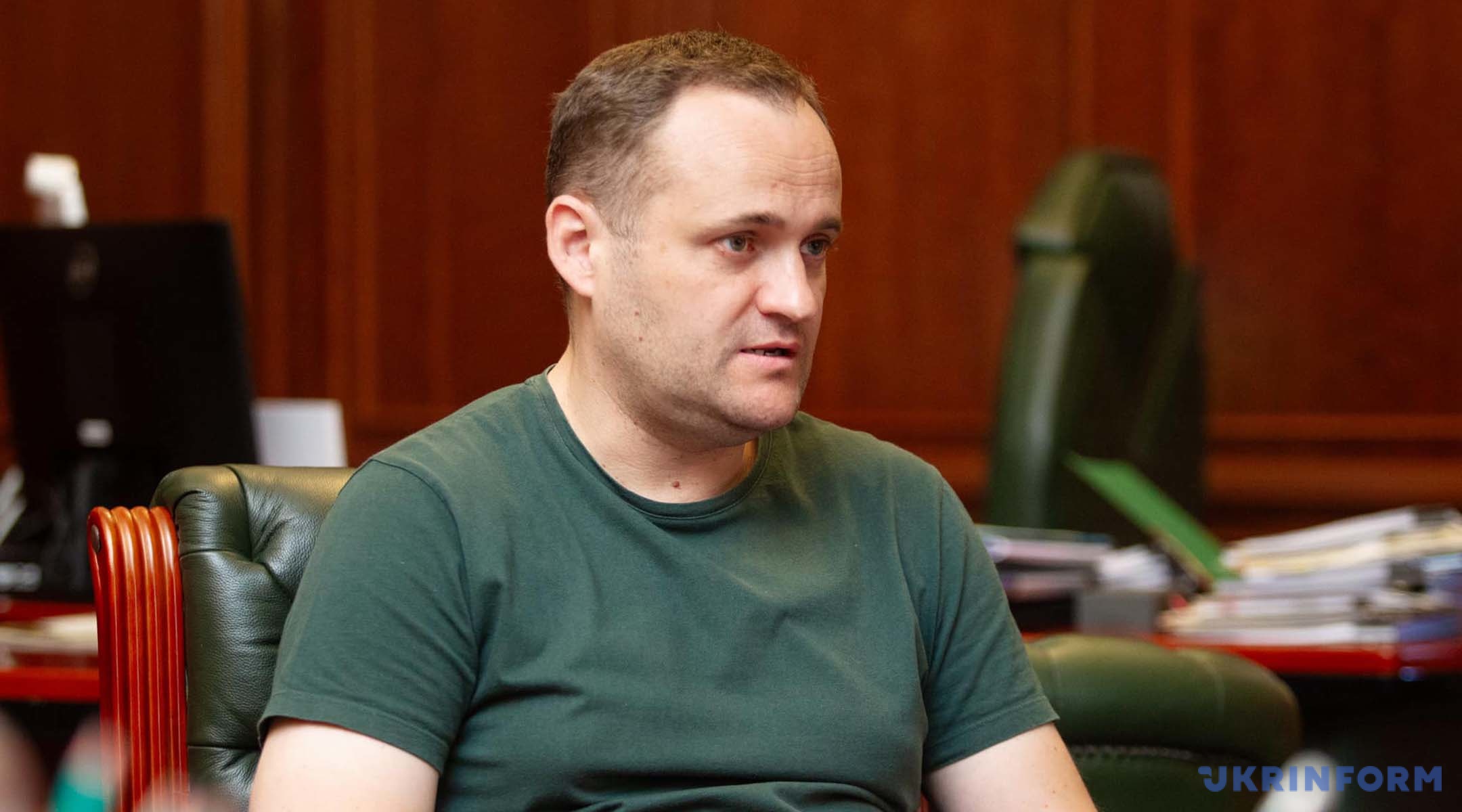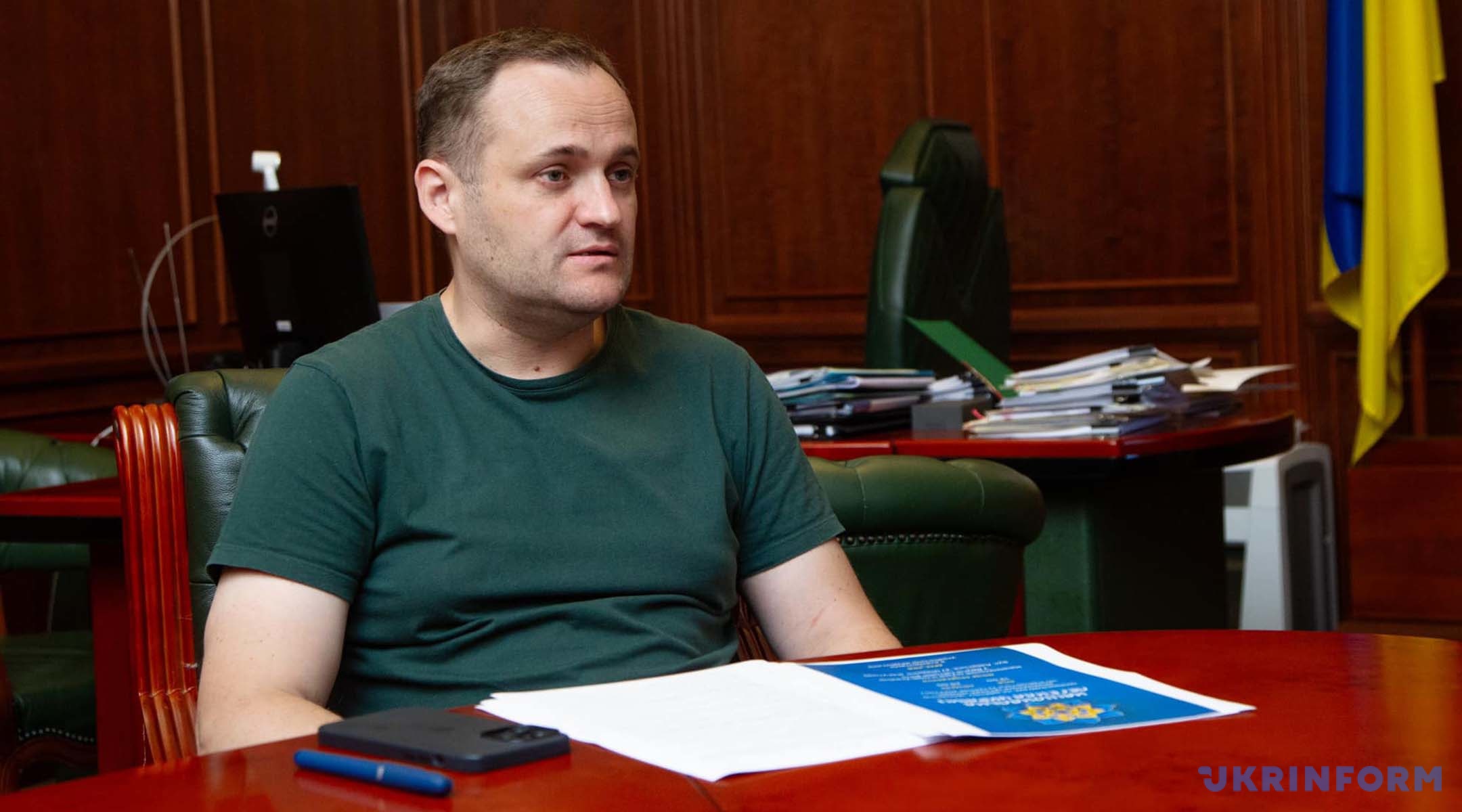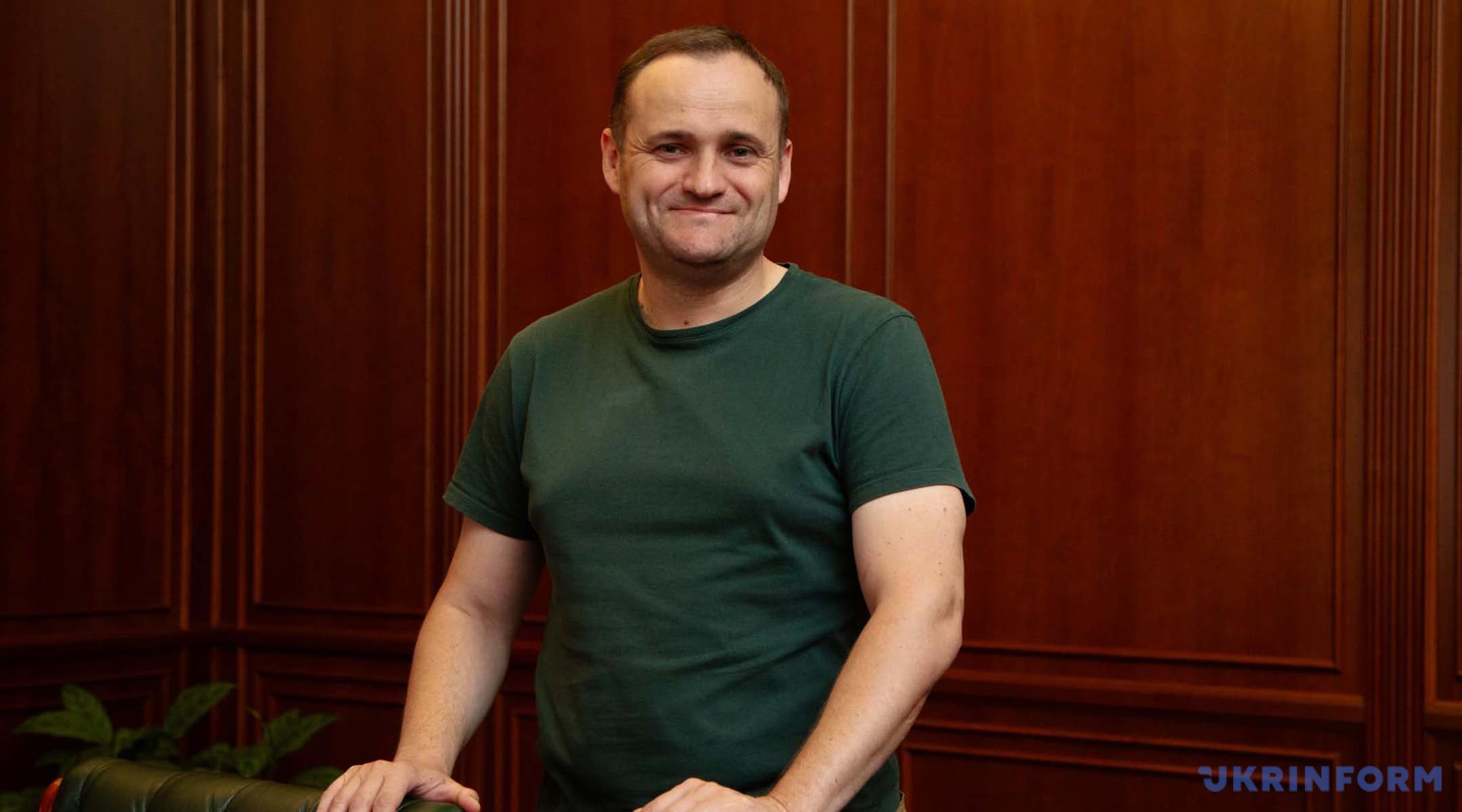The full-scale invasion of Russian troops became a litmus test for many processes in Ukraine; it demonstrated, among other things, the capacity of communities and local bodies to address pressing issues, make quick and extraordinary decisions and interact among themselves.
Oleksii Kuleba, Deputy Head of the Office, supervises regional policy in the Office of the President, and he is also the Executive Secretary of the Congress of Local and Regional Authorities. However, he rarely shows up in the media.
Ukrinform talked to Mr. Kuleba about the cooperation of regional and local leaders, the reconstruction and recovery of Ukrainian cities and villages, the prospects of the decentralisation reform and how citizens on the home front can and do help those at the frontline.
WE HAVE TOTALLY UPENDED THE WORLDVIEW OF THE EUROPEAN COUNTRIES AND GLOBAL LEADERS, AND NOW WE NEED TO PRESERVE THAT
- Ukraine celebrated the 32nd anniversary of its independence, and for the second time, this day was observed amid the full-scale war when its centuries-old struggle against Muscovy reached its apex. What does Ukraine’s independence mean to you?
- In terms of mentality shifts, we divide the time that passed since the independence of Ukraine into certain phases, each of which saw specific changes. These are revolutions that greatly affected us all, the beginning of Russia’s invasion and the full-scale war eight years later, which has united and is uniting our people, is making our country stronger.
However, it seems to me that all these events emphasise the most important thing: we have shown the whole world that the Ukrainian nation exists and there are free people who are capable of fighting, not with words but with arms, the enemy who is much bigger and has more natural resources.
During the first months of the full-scale invasion, we totally upended the worldview of the European countries and global leaders, and now we must preserve that. We should do so not only in the international arena. We should also maintain our unity at home to become even stronger and more vigorous after our victory.
- You coordinate regional policy in the President’s Office and, accordingly, communicate with local authorities and different regions all the time... What do you see locally? Have we lost that unity of the first months of the war? Is there any consolidation between local governments, central and regional authorities, and the military?
- The war greatly affects the life of the regions; they need different solutions depending on the challenges they face, issues on their agendas and current tasks.
On the one hand, there are regions affected by active combat operations. These are our Kherson, Zaporizhzhia, Kharkiv, Donetsk and Luhansk regions. Their agenda differs from that of other regions, as everything depends on events and challenges at the front. Security and defence are at the top of the list not only in media or social media; they shape the reality of every minute of life for the people there. We have no right to forget about it; we should be aware of it and always speak about it.
The agenda is somewhat different in Central Ukraine, in the Kyiv region and the de-occupied Chernihiv and Sumy regions, although the latter two regions are being shelled daily. However, their issues and problems are very similar as they primarily relate to the safety challenges that our citizens face.
Another area is our rear or the Western regions of Ukraine. These regions should focus all their efforts on helping those suffering the most from combat operations and the people who are now defending their country on the battlefield.

- How effective is the interaction between regions?
- If we look at the authorities, at the different government branches, they do work together. We let aside certain political issues and focus now exclusively on the defence and its results. It should be remembered that the military is also involved in this interaction. This factor is essential now because it is the military that offers solutions to most issues and challenges.
- Does the establishment of military administrations and their operation alongside local governments give rise to competition between government branches or, let’s say, produce the erosion of responsibility, or, conversely, a shift of powers at the local level?
- At the moment, military administrations meet current challenges. There are lots of issues that today cannot be addressed in the usual manner, but quick or military decisions need instead to be adopted in coordination with all government representatives. Kharkiv, Kherson, or other regions at the frontline suffer from permanent fire... There are so many daily issues or challenges there that it is simply impossible to do anything other than respond quickly to everything and assume responsibility.
And it is all about doing your best to win, not about competition.
City mayors work together with military administrations.
For example, winterisation is, let's say, on the agenda that includes a list of issues related to the urban utility sector and also, in principle, to supplying energy to regions and the safety of critical infrastructure.
And if we take the security component, agendas are totally different there. Each city mayor has a vital interest in maintaining cooperation with the head of the regional military administration and the military. And the opposite is also true. That is why we can now only talk about joint coordination.
OVERSIGHT AND MONITORING OF DECISIONS TAKEN BY LOCAL GOVERNMENTS ARE CRUCIAL FOR THE COMPLETION OF THE DECENTRALISATION REFORM
- Is the decentralisation reform still relevant in such circumstances? If I remember well, the regulation of oversight by the central government of local government decisions was the last issue that the country tried to resolve before the full-scale invasion. Are we able to continue the reform in times of large-scale war?
- Ukraine is not just able to but continues to develop the reform amid the large-scale invasion. Today, Ukraine has raised the bar high, in particular in the eyes of its international partners. Oversight and monitoring of decisions taken by local governments are crucial for completing the reform. This oversight should primarily be performed by the public. The public is a direct participant in the political events taking place within local governments, and we, therefore, should reflect this in our legislation. Of course, it in no way excludes the central government’s oversight, which should also be legislated.
Decentralisation made our communities much stronger. The reform has not been suspended. In a year and a half, we learned how to fight in the war, make reforms and perform legislative work to become an EU member as soon as possible.
We definitely continue the dialogue on how to move forward with the decentralisation reform every day. Consultations are in progress, and the public and the Ministry of Recovery work together with the competent Verkhovna Rada committee. The Office of the President, including me personally, is also involved.
- President Volodymyr Zelenskyy more than once encouraged people in the rear cities to help the army more vigorously. Minister of Defence Oleksii Reznikov said recently that the war might protract, and the Ukrainians should be prepared for the fact that everyone may go to war. Certainly, many people decided how they would help the country as early as 2014, and some made that decision on 24 February; they deliver cars to the military, weave nets or cook delicacies... Other people are mostly ready to engage in assisting, but they may not know what to do, how to do this and where to go. What does the government offer to citizens to inform them of what to do, where and how?
- First of all, everyone should just do their job in their place. For instance, the aftermath of the Russians’ terrorist attack on the Kakhovska hydroelectric power plant is still being mitigated in the Kherson region, and people from all over Ukraine are working there. These people came from different cities, they are employees of utility service providers, and they, together with the Kherson people, have been delivering the help you are talking about for over two months.
We also have a special programme called Side-By-Side; this pilot initiative fully meets the demand for engaging people in delivering assistance. Fifteen regions sent their people, their professionals, to recover communities in the Kherson region. They have already reconstructed more than 400 facilities.
The principles of patronage and interregional relations work perfectly well. If you visit those communities, homes or people where other people from Rivne, Ivano-Frankivsk or Ternopil regions came and are restoring their housing, you will see what the nation’s unity in action means. Incredible emotions are running high there. So, we mean this approach when we talk about the need for real actions and not slogans.

- The Side-By-Side programme is so far being implemented in the Kherson region only. Are there plans to include other regions affected by the Russian aggression in it?
- Yes, we plan to scale up this project. But we want to do so not only in terms of regional coverage. We do not want this project to be further used exclusively to repair buildings, although there is an enormous demand for it from people, and its urgency is obvious. However, there is an idea to scale it up to other areas: social area, culture and sports.
- If we talk about recovery, does the State or the Office of the President have a vision of how the future Ukraine should look? What is the recovery strategy for infrastructure or the economy? For example, when the Donetsk region is de-occupied, will the focus there be again made on metallurgy and mines, or, let’s say, agriculture will be developed?
- A long list of issues exists here, as well as a great demand for it. At the Verkhovna Rada, the President (Editor’s note: On 28 June, Zelenskyy, while speaking in the Parliament, proposed to join the discussion on the future of Ukraine) made a major speech on the development vision and invited society to answer the fundamental questions related to the future of Ukraine in the next five to ten years.
Let’s recall the milestones of the development of our country, its crucial points, which are the revolutions of 2004 and 2014, and other very important stages. What happened then? A civil society was indeed emerging, but as time went on, we saw no changes that had been demanded by a large segment of the nation. It seems to me that this fact was related to the lack of institutional support for the demand generated by Ukrainians.
Now, the doctrine is a great chance to outline our general priorities for a very long period and define what our country will be like, not only in terms of economy but also in terms of culture and information.
- When will the public be able to see these visions?
- It is a large dialogue; it cannot be unilaterally adopted by the President together with the Verkhovna Rada and the Government. It is not possible. There will be discussions with people, public discussions.
It encompasses a large range of issues, which, I am sure, we will soon see in the public space.
Currently, the National Security and Defence Council is working together with state institutions; it sent requests to virtually everyone to collect information and analyse their proposals.
Then, we will use the regional approach and hold a broad discussion. This is precisely what the Ukrainian doctrine of our future should be based on.
DURING THE WAR, WE SHOULD DO WHAT WE CAN DO HERE AND NOW, QUICKLY BUT TO A HIGH STANDARD
- But our reconstruction is already underway. I mean, we are now mostly repairing and reconstructing what was destroyed. Are the so-called projects of the future not on the table?
- The war is going on now. And the decision on how the reconstruction will be carried out was made as early as last year. I consider this decision to be correct and effective. It offered tens of thousands of citizens an opportunity to return to their homes because the government decided in the first place to make quick repairs by replacing roofings, installing windows, etc.
After that, certain changes occurred in the government, two large ministries merged, and a clear hierarchy of governance was established to deal exactly with recovery issues, including today’s realities, operational issues and strategy. Oleksandr Kubrakov, Deputy Prime Minister and Minister for Communities, Territories and Infrastructure Development of Ukraine, is dealing with these issues. They have made a huge effort to develop a recovery policy vision. And now, they are communicating both inside Ukraine and with international partners.
I am convinced that during the war, we should really do what we can do here and now, quickly, but to a high standard, and after our victory, we obviously should enter a completely new level, which should correspond to requests and challenges that society has gone through.
- You mentioned international partners. What does Ukraine offer them? Is it its potential, or do we place specific projects on the table? To what extent are foreign businesses willing to come to us? Are there, possibly, any agreements to launch their activity, but after the victory?
- It is a matrix which operates both vertically and horizontally. There are some countries like, for instance, Denmark, which made a clear choice for the recovery of the Mykolaiv region and performs this job very effectively. The Danish business has not entered Ukraine yet, but there is confidence that it will start operating immediately after the victory.
Estonia is doing the same in the Zhytomyr region, and Lithuania helps also... There are examples of other countries active in other regions.
However, another, more sectoral cooperation framework exists when companies or international foundations arrive and seek to be active in a particular industry. Our mission is to coordinate all this.

- Are there many companies ready to arrive?
- Many international foundations and many international organisations have arrived. With regard to business, it is also there, it is also present. Of course, businesses consider the regions of Western Ukraine to be their priority.
In order to address the matter of the arrival of businesses and investments, we have to manage the issue of insurance against the risks that businesses will face here.
And it is important to coordinate the process of attracting foreign investments. That is why we established regional offices for international cooperation based on regional military administrations, using the platform of our Congress of Local and Regional Authorities. They only exchange information between territorial communities and regional military administrations, on the one hand, and the international organisations and foundations, on the other. They do it, of course, if there is a demand for that.
Olena Lytvynenko
Photos by Kyrylo Chubotin
